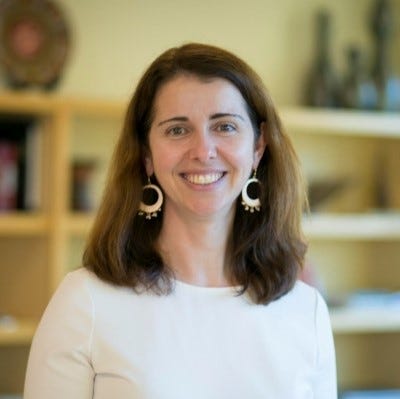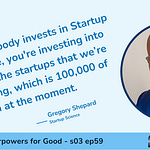This episode was produced as part of research for Superpowers for Good. The accompanying text is a sample chapter from the book.
Isabelle Hau, Author
Devin: Isabelle, what is your superpower?
Isabelle: My superpower: diplomacy.
You can watch the full interview with Isabelle here: isabelle.s4g.biz.
John Hewko, Rotary International, CEO
Devin: John, what is your superpower?
John: My superpower?
Oh, I don't think I have superpowers. I do think, like any human being, I've got strengths and weaknesses. I do think I have an ability to sort of grasp a strategic vision and then sort of rally people around to try to achieve that and take people with disparate points of view and different perspectives and get them to kind of get to yes. And then move the ball forward, which is what makes this job so interesting because it is such a diverse, I mean—
Devin: There are people in Rotary that have a different perspective?
John: You know, 1.2 million Rotarians,1.4 million points of view. That's about as diverse as you can get. And I think that it's, on the one hand, a challenge, but for me, kind of an exciting thing. And I think one where I give, in my international experience, language skills. It's been kind of like trying to run the U.N., you know, on a much smaller scale. And I find it both interesting, intriguing and challenging.
You can watch the full interview with John here: john.s4g.biz.
Isabelle Hau, an author with deep experience in the social sector, and John Hewko, CEO of Rotary International, both described their superpower as being diplomacy. Each has an extraordinary track record of impact that you should consider briefly before learning to be more diplomatic.
Starting with Isabelle, she helped lead Imaginable Futures, a philanthropic investment fund focused on education, as Omidyar Network spun it out. She had spent nearly a decade at ON responsible for leading impact investments in education. Previously, she had a successful career at Morgan Stanley, where I first met her. She earned an MBA at Harvard.
She is passionate about early childhood education because, in her birth country, France, she was cared for in subsidized childcare beginning at just three months of age and began attending no-cost pre-school at age 2 ½.
“Through these affordable and high-quality programs, I learned not [only] early literacy and early maths, but more importantly all the social-emotional learning skills that have helped [me] navigate my personal and professional journey,” she explained.
She highlighted that children without adequate preparation upon enrolling in kindergarten are 25 percent less likely to graduate from high school and 60 percent more likely to skip college. Children who are not performing at grade level in the third grade have demonstrably more challenging lives.
At Imaginable Futures, she helped lead investments in education in the U.S. and abroad. Today, she is working on a book about the future of education.
As an investment banker and investor, she has been called upon to negotiate transactions even with a philanthropic purpose. In that role, she developed and used her superpower: diplomacy.
Similarly, John Hewko has used diplomacy as the top executive at Rotary International, which operates in more countries than the United Nations has members. Previously, as part of the Bush Administration, he was a senior official at the Millennial Challenge Corporation, working to support economic development in various African and other lower-income countries. Before that, he worked as an attorney in Eastern Europe.
At Rotary, the top priority is eradicating polio, an effort Rotary launched in 1985. John is passionate about the effort, personally helping raise over $50 million with an annual bike ride in Tucson, Arizona.
Rotarians play three primary roles fighting polio, John says. First, they raise money. The total raised by Rotary now tops $2 billion. Second, they advocate with governments around the world for financial support and cooperation with vaccination efforts. Third, Rotarians volunteer; hundreds of thousands have helped vaccinate children.
The impact has been dramatic, with the number of wild poliovirus cases dropping more than 99.9 percent from the 350,000 cases observed each year in the mid-1980s.
Significantly, diplomacy plays a vital role in the effort. Since the beginning, Rotary has partnered with the World Health Organization, U.S. Centers for Disease Control and UNICEF. The Gates Foundation joined the effort about two decades ago, and more recently, GAVI (the vaccine alliance) joined the partnership known as the Global Polio Eradication Initiative.
Diplomacy is a conscious part of the coordination effort among the GPEI partners. Not only are significant budgets determined, but lives hang in the balance. Negotiating with the best of intentions is essential.
Perhaps the most vivid example of diplomacy on the part of Rotary is working with warring parties to temporarily suspend fighting to allow for vaccinations—days of tranquility. For instance, Rotary has been successful in Sri Lanka and El Salvador. Sometimes, the pause in fighting has resulted in a long-term or permanent end to hostilities.
Rotary and Rotarians have also used diplomacy to respectfully combat vaccine resistance on a scale that varies from the most personal to multinational. The efforts have been successful, especially when people work in coordinated ways at every level, from neighborhoods up to the national leadership.
Diplomacy is a superpower that Isabelle and John have deployed in business, government and for social impact. You can, too.
How to Develop Diplomacy as a Superpower
Having read about how Isabelle and John use diplomacy for good, you are ready to learn more about being diplomatic.
John joined me for a follow-up conversation to discuss his insights. You can watch that second interview here: hewko.s4g.biz. [That links you to a video of this podcast episode.] He provided guidance on conducting negotiations diplomatically.
1. Listen. Effective diplomacy requires listening. By listening, you can understand and more thoroughly appreciate the other perspective. You can see how your different agendas align.
2. Define agreements. As you begin to negotiate, John suggests that you make an early effort to identify areas of agreement. Often, a document exists. It may be a contract, a joint public statement or a high-level mission and vision document. In any case, look for the points of agreement. Doing so serves two purposes. First, it builds confidence between the parties, and second, it accelerates the process so that the negotiation can proceed concerning points of disagreement.
3. Narrow disagreements. Once you identify the points of agreement, you don’t have to work on them anymore. Move your attention to the topics in dispute. Work to define those points as narrowly as possible. Once that is done, both parties may agree that such tiny issues don’t matter as part of the whole.
4. Compromise. If the points of disagreement do matter in the larger context, compromise is the final stage of diplomacy. Having built mutual confidence and a long list of points of agreement, you are in a position to negotiate a compromise. You can work in good faith to resolve the final pain points.
By following John’s guidance, you can develop your diplomatic skills. One day, diplomacy could become your superpower.














